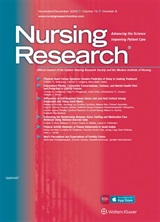
Editor's Note A scoping review of 15 studies reveals that the COVID-19 pandemic significantly disrupted oncological abdominal surgery (OAS), leading to postponed or canceled procedures, adoption of alternative treatment plans, and increased psychological stress among surgical teams. Published November 5 in the American Journal of Surgery, the findings emphasize the…

Editor's Note A study analyzing data from the National Database of Nursing Quality Indicators (NDNQI) revealed that nursing-sensitive quality indicators (NSIs) worsened during the COVID-19 pandemic and remain elevated years after the onset of the pandemic, reflecting ongoing challenges in nursing practice. Published in the journal Nursing Research, the findings…

Editor's Note In a November 12 letter to Congress, the American Hospital Association (AHA) outlined its priorities for the lame-duck legislative session, focusing on measures to stabilize hospitals and health systems facing significant financial and operational pressures. If enacted, these recommendations would support the nation’s healthcare infrastructure amid rising…

Editor's Note A new meta-analysis of 85 studies reveals a significant association between nurse burnout and negative outcomes in patient safety, satisfaction, and care quality. The findings underscore the impact of burnout—characterized by emotional exhaustion, depersonalization, and low personal accomplishment—on healthcare performance globally, with implications for organizational and policy interventions,…

Editor's Note In honor of World Mental Health Day October 10, the American Nurses Foundation announced a free curriculum for improving nurse support and well-being. The free curriculum is available to all nurses. It includes an overview, a training guide for nurse leaders, an implementation guide, and the complete course,…

Every year, OR Manager shines a light on staffing issues via the Salary/Career Survey. In this issue, two articles take a careful look at the career and profile of the perioperative leader in both inpatient and outpatient settings. Next month, two more articles will do the same with salary trends…

Takeaways • Surgical volume continues to increase for most organizations. • Staffing remains a challenge, although some parameters, such as recruiting and turnover, have improved slightly. • Filling an open RN position takes an average of 77 days, and filling a surgical technologist position takes an average of 120 days.…

Takeaways • Compared to 2023, the percentage of respondents reporting an increase in open positions for RNs and STs, as well as increased turnover for RNs, remained stable, but fewer reported a drop in ST turnover. • The percentage of respondents reporting hiring more managers set a 9-year record. •…

Editor's Note The American Medical Association (AMA) annual, nationwide prior authorization survey reveals that over 90% of physicians believe prior authorization negatively impacts patient clinical outcomes. “More telling,” AMA reported July 17, is the fact that 78% of physicians report that this process “sometimes or often” leads to patients abandoning…

Editor's Note Although fewer Michigan nurses planned to leave the profession in 2023 compared to 2022, the profession still faces unsafe conditions, understaffing, and high rates of abuse, according to a two-year, statewide survey published July 18 in JAMA Network Open. Conducted by researchers at the University of Michigan School…